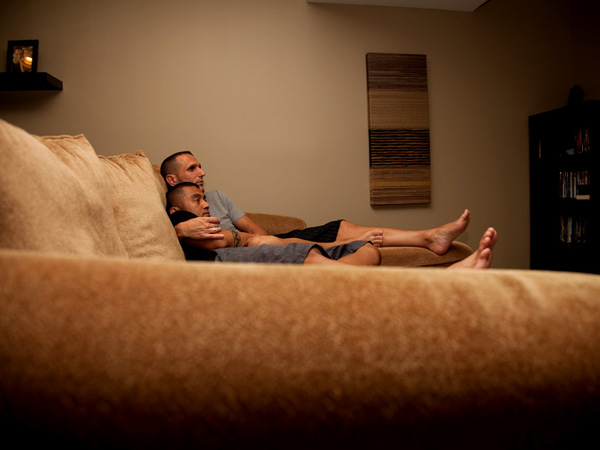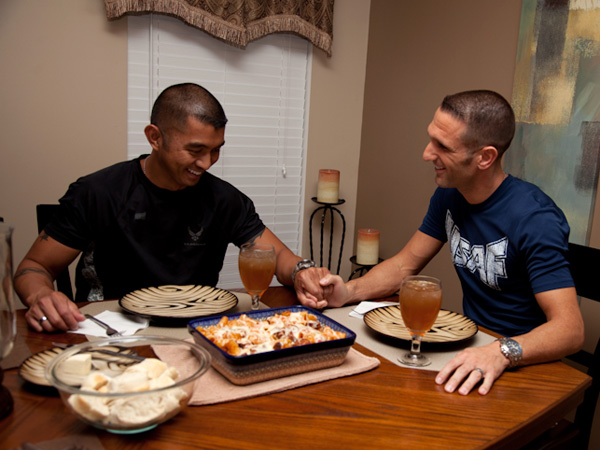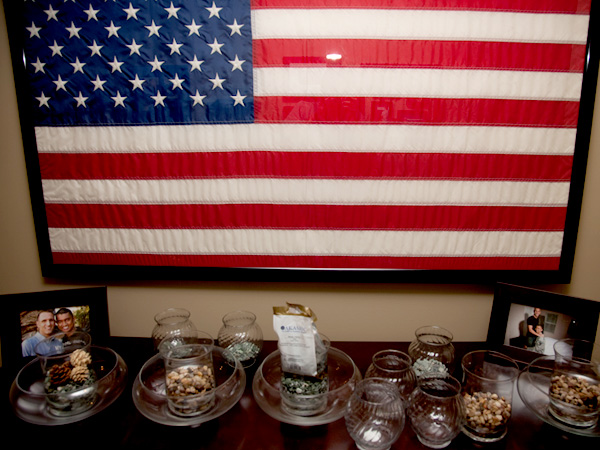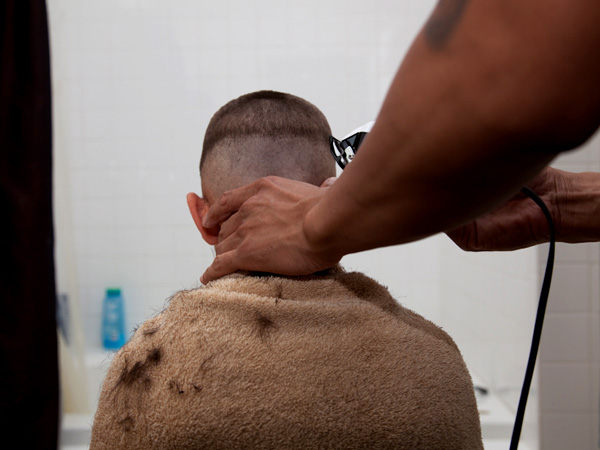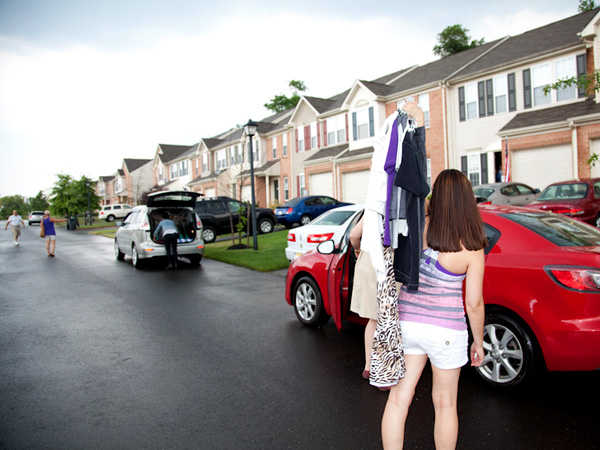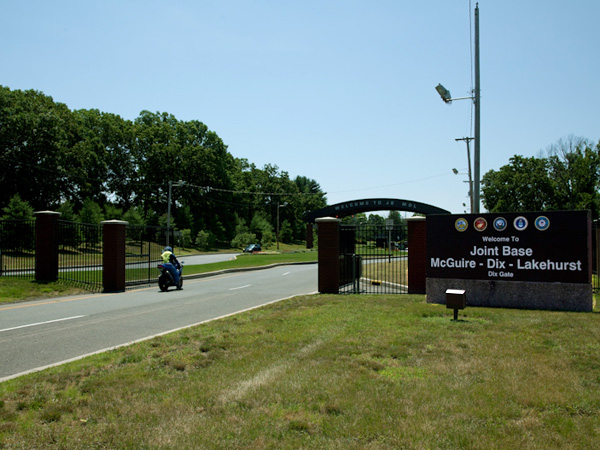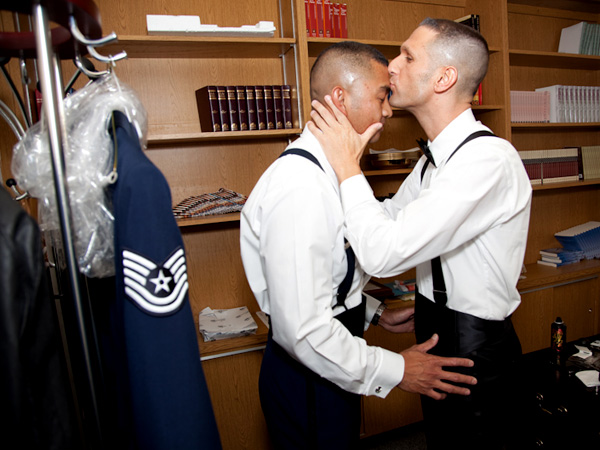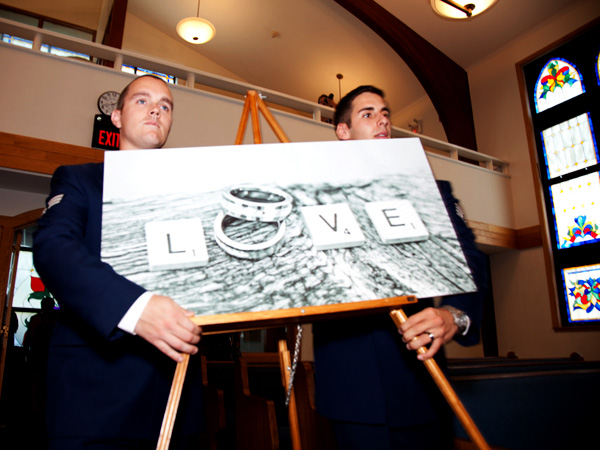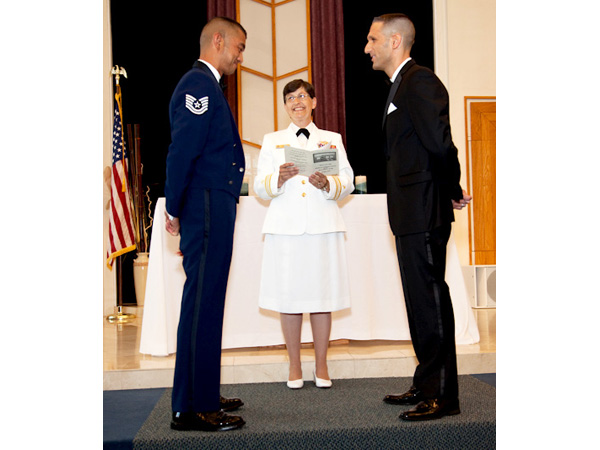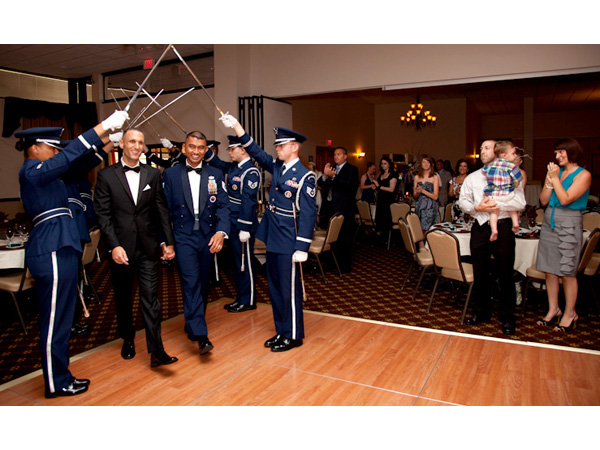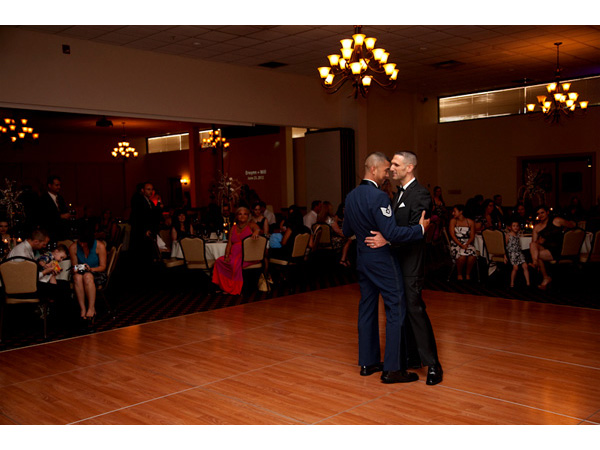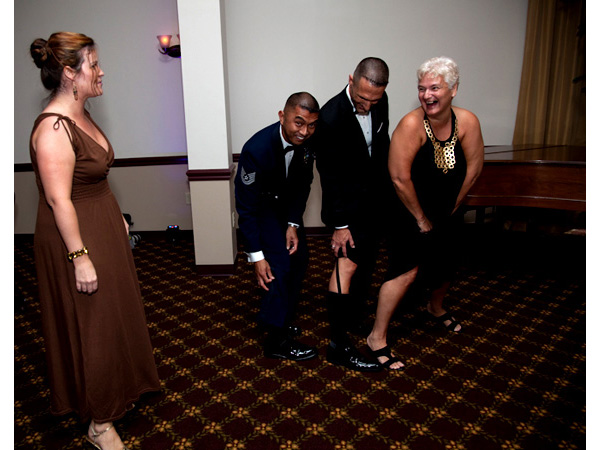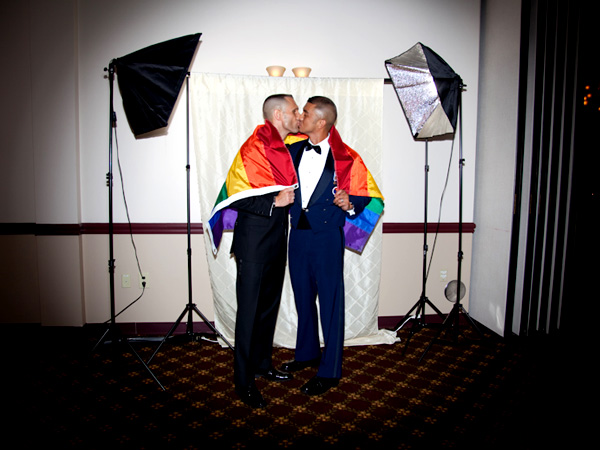The Wedding
Will and Erwynn met at church and fell in love. But they had a big problem—“don’t ask, don’t tell.” The unlikely story of the first gay military union.
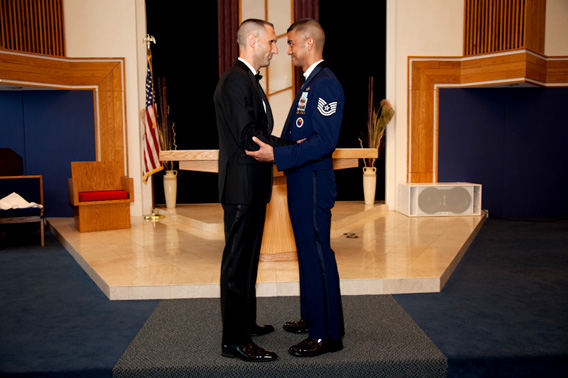
Photo by Jeff Sheng
It’s almost Christmas, and I’m eating lunch with Tech Sgt. Erwynn Umali and his fiance Will Behrens at a Cracker Barrel in New Jersey. Erwynn, 34, is an active-duty serviceman in the Air Force. Will, 35, is a branch manager for a financial firm. There are six months to go until Will and Erwynn get married at McGuire-Dix-Lakehurst, a joint military base in Wrightstown, N.J. It will be the first publicly announced gay civil union or wedding ever to take place on an American military installation. But today is about family, not planning for the big day. With us are Will’s children from a previous marriage, his 11-year-old daughter and 9-year-old son. When the country fried steak and chicken and dumplings arrive, everyone joins hands in prayer. Will thanks God for our food and prays that I’ll make it home safely. We say amen and eat.
Little about the couple’s biographies would suggest that they would become gay rights trailblazers or find themselves on the progressive side of a culture war. Will was born outside of Chicago in 1976. His mother was a teacher. His father, a Marine-turned-fundamentalist-minister, spent most of the year on the road through his work with Fairhaven Baptist church in Chesterton, Ind. Will’s father was its youth pastor and vice president of the church’s small Christian college.
Fairhaven Baptist was founded by Dr. Roger Voegtlin, a firm believer in corporal punishment. Will recalls Dr. Voegtlin giving spanking demonstrations and instructions during church. Will’s parents followed Dr. Voegtlin’s example, imposing strict discipline on Will and his three siblings. Will ran away from home twice, in fifth and sixth grade, because he was so fearful of punishment from his father.
Will attended Fairhaven Baptist Academy, the K-12 extension of Fairhaven Church. Last year on Anderson Cooper 360, former students of the academy alleged that they were subjected to a host of abuses, including violent public beatings and humiliation for minor infractions at the hands of teachers and school administrators. In the CNN interview, Dr. Voegtlin admitted that public paddlings meant to humiliate children had taken place, but he denied knowledge of other incidents of abuse that the students alleged. Will describes Fairhaven as “not a place I want to remember,” and says he’d never send his own children to school there.
As a kid, Will was passionate about music, particularly orchestra and piano. But the community preferred sports as a hobby for boys. Will wrestled and eventually became co-captain of the soccer team in high school. He couldn’t allow himself to ask, even in his own mind, whether he might be gay. He believed, as he later explained to me, that “God knows your thoughts, and if you even think something like that, God could strike you dead and send you to hell.” He also feared what might happen to him if people suspected he was gay. “Kids got shipped off to homes,” Will recalls. “There was a girls home and a boys home. If a girl got pregnant in high school, or someone suspected you were gay, they sent you away.” His sister, Jo Ann Trout, says that to Will’s parents, being gay was “like never being born to the family.” (Will’s parents did not respond to repeated requests for comment on this article.)
Will stayed true to the teachings of his parents and his church. He attended Fairhaven Baptist College, earning a degree in pastoral theology and music. He married his wife, a childhood friend and college classmate in 1998. Then they moved to New Jersey so Will could pursue a career in business. They had two children.
Around that time, Will’s parents left the Fairhaven community. According to Will, they had become disillusioned with Dr. Voegtlin’s harsh teachings and methods. They moved to a different fundamentalist Baptist church in Pennsylvania. Will and his wife found a new congregation, too. They joined Solid Rock Baptist church, where Will became the choir director. Anti-gay sermons were common at Solid Rock, but Will never dared speak up. You “could never disagree with what the church taught,” he says.
* * *
Will’s future husband, Erwynn Umali, was born in the Philippines in 1977. When he was 5, his family immigrated to a suburb of San Diego. His parents gave their three sons and a daughter rhyming names: Alwynn, Erwynn, Jerwynn, and Sherwynn. They raised the children as strict Catholics with traditional Filipino family values.
Erwynn’s family never discussed homosexuality, but the kids knew that it was forbidden in the Bible. Erwynn was macho and the most vocally homophobic member of the family. He made fun of gay men, imitating limp wrists and a lisp. But he knew, even in elementary school, that he was one of them.
Like Will, Erwynn wrestled in high school. He played on the varsity volleyball team. His sister, Sherwynn Umali, says he fit in easily at school but doted on his extended family of “aunties.” He went to community college and San Diego State. In 1998, the year Will got married, Erwynn entered the Air Force. Erwynn loved the camaraderie and the knowledge that he was serving his country. Two years later, he married his wife, a fellow airman. They had two sons.
Both young men had done what they were supposed to do. They had gone to school, gotten married, and had kids. But something wasn’t right. “Sometimes,” Will recalls, “I’d look out the window of my bedroom and think, ‘Is this really it? There’s something missing.’ ” Erwynn had the same uneasy feeling: “I was still looking for something else that I know I’m not supposed to be looking for.”
In 2005, while stationed in Korea, Erwynn split from his wife. Both of them say that the divorce was unrelated to his sexuality. Erwynn asked to be stationed at McGuire-Dix in New Jersey in order to be closer to his sons, who were living in Maryland at the time. In 2006, still recovering from his divorce and looking to join a community, he accepted a co-worker’s invitation to visit Solid Rock Baptist Church. The congregation seemed friendly and appreciated his military service. He felt valued.
Erwynn thought that by going to a church that preached against homosexuality, he could convince himself he wasn’t gay. He thought Solid Rock could give him the structure and resolve to stay straight. Instead, as anti-gay messages rang from the pulpit, Erwynn’s eyes wandered to the third row on the left side. There, they fell on an attractive young man: the choir director.
Will and Erwynn were introduced by a mutual friend at church. Over the course of a few years, they became friends. Erwynn was deployed to Afghanistan in 2008, working with the provincial reconstruction team. He handled convoy communications and driving Humvees. He was also a gunner. During his deployment, the two men grew closer, staying in touch through email and text messages. Later that year, when Erwynn returned home, they were confused and distressed about their feelings for each other. Will had already felt distance brewing in his marriage. Now, on top of that, he was attracted to Erwynn. Each man wondered whether the other felt the same way. Will, fearing disappointment, began to cool to Erwynn’s friendship. “This is never going to happen,” he told himself.
A church retreat saved them. The all-male, two-day trip, featuring softball, paintball, and thrice-daily preaching sessions, was supposed to promote fellowship. It gave Will and Erwynn quality time together. They felt closer and more bonded. They began testing the waters with flirtatious emails. Will worried about being separated from his children if he left his wife to pursue a relationship with Erwynn. “I still want my kids,” Will thought, “but I know I’m slowly falling in love with a man.”
Erwynn’s final attempt to straighten himself out, a second marriage to a woman from Solid Rock collapsed in 2009 after only a few months. That’s when Will and Erwynn admitted their feelings to each other and began a romantic relationship. Will knew what he wanted, but the price was enormous. He would lose not only his marriage, but also likely his parents, siblings, and all of his Baptist friends. Erwynn stopped attending Solid Rock, knowing the congregants would be appalled by his relationship with Will. Members of the congregation encouraged Will to cut off his friendship with Erwynn, since Erwynn had rejected the church.
The secrecy of the relationship began to wear on Will. He started to make excuses for not attending church. This left the congregation without a choir director and raised red flags, in the community and with his wife, that something was wrong. On Feb. 17, 2010, when Will came home from work, all of the lights in his house were on. He saw several familiar cars parked out front. His father, who lived two hours away, was waiting for him in the street.
Terror mounted in Will as he walked into his living room with his father. There, he found his wife, three pastors from the church, and one of the pastors’ wives. Will backed into a corner as the others sat around him. After an opening prayer and a heavy silence, one of the pastors turned to Will. “I don’t know how else to say this,” he prefaced. “Is there something going on with you and Erwynn?”
Will told the truth. “Yes,” he said. His wife jumped up and ran out of the room, followed by the pastor’s wife. Will knew what was coming next: They would try to “cure” him and save his marriage. But he was done pretending. “I can’t do this anymore,” he said. He walked out of the house and got into his car. The group chased him down the block and called him on his phone, urging him to come back to the house. Instead, he drove away. He texted Erwynn: “I’m coming home.”
Will’s life had exploded. But the hiding wasn’t over. Under the military’s “don’t ask, don’t tell” policy, Erwynn could lose his job if anyone reported to his commanding officer that he was gay. If an investigation was opened, irrespective of his job performance, he could be discharged, just like 14,500 other servicemen and -women purged under DADT. Will collected two carloads of possessions and took them to Erwynn’s one-bedroom apartment. There, they began their life together in cloistered isolation, not knowing how long they’d have to maintain their secret.
They were no longer welcome at Solid Rock. With one phone call, any congregant who had claimed to love the military could end Erwynn’s career. Two members of the church who worked on base were senior enough to start an official investigation into Erwynn’s sexuality anytime. He caught a member of the church surreptitiously taking photos of him and Will together at Wal-Mart. Was she building a case to turn in to the military? Erwynn didn’t know. (Solid Rock Baptist Church did not respond to requests for comment.) The couple strategized about how they would get by on one income if Erwynn was discharged. Whenever they went out to eat dinner or buy groceries, they scanned for familiar faces. Even on trips to Philadelphia or New York City, they ran into people they knew. Nowhere felt safe.
When it became clear that Will was not coming back to his family, his parents stopped talking to him. He heard nothing from his immediate or extended family. He felt disowned. He had never been without a church. He felt he couldn’t seek out new friends or share with anyone at work what he was going through because that could cast suspicion on Erwynn.
Will struggled through a difficult divorce and custody disputes. He cried himself to sleep over losing his kids and alienating his community. Having followed Baptist teachings his whole life, he began to explore what it meant to form opinions on his own. He volunteered as a pianist for McGuire-Dix functions and got to know more of Erwynn’s colleagues as his “friend.”
On Dec. 15, 2010, the U.S. House of Representatives passed a bill repealing DADT. Three days later, the Senate concurred. President Obama signed the bill into law on Dec. 22, 2010. The repeal’s implementation was delayed, but in the summer of 2011, knowing that the end of hiding was only a few months away, Will got down on one knee and proposed to Erwynn.
* * *
When I go to visit Will and Erwynn the Sunday after Easter in 2012, much has changed since the fearful days of 2010. Gay and lesbian service members are able to be open about their orientation. Will and Erwynn moved out of their one-bedroom apartment and now live in an immaculately tidy three-bedroom townhouse decorated with dark wood furniture sets and brown and teal accents. They live 20 minutes from McGuire-Dix, in a subdivision where the houses look identical and the streets have floral names. Many military families live here, but it’s easy to pick out Will and Erwynn’s house: It has the most American flags.
Two of the three bedrooms are permanent kids’ rooms: one for the three boys, the other for Will’s daughter. All four children primarily live with their mothers out of state, but it’s clear Will and Erwynn live for their kids, sharing stories about what they are up to and activities the family does together when the kids are visiting. Every vacation day they have is spent with the children. Erwynn’s kids have taken to calling Will’s cellphone to chat with him. Erwynn’s ex-wife raves about how much Will loves his kids, and hers.
Will and Erwynn prop open the computer on the dining room table while Skyping with Will’s children in the evenings, so it’s like they are all having a family dinner. Family photos line the walls, alongside the American flag Erwynn took with him on every Air Force mission. Will had it framed for him. The two men have the same haircut and often wear virtually matching outfits. They even like to talk to people together on the phone. They seem a little giddy about finally being able to be themselves, together, before the whole world.
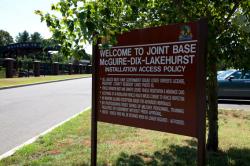
Photo by Jeff Sheng
Coming out on base was much easier than Erwynn expected. Right after the repeal of DADT, his squadron held a farewell luncheon for him before he began a special duty assignment. In front of 40 of his fellow airmen, Erwynn announced that he wanted to thank a particular person for support and encouragement in helping him succeed. Everyone assumed he was referring to a colleague. Instead, he announced that this person was his partner and fiance, Will Behrens. Two beats of dead silence were followed by a standing ovation.
Erwynn is now a leadership school instructor, running five-week courses airmen must complete in order to become staff sergeants. As part of the lesson he teaches on stereotypes and diversity—a standard part of the curriculum—he has come out to his students. Initially, they were shocked, but like other young people, they have been largely supportive. Even older, career officers have accepted him. The only military people who seem taken aback by his orientation are much older, retired servicemen. But as Erwynn points out, people in the military are very good at following orders, including the repeal of DADT.
Coming out as gay Christians has been harder. For most of their lives, Will and Erwynn have been in faith environments that condemned homosexuality as a sin. Despite their exile from Solid Rock, they are still deeply religious, and Will keeps returning to the idea in the Bible that God loves you no matter what. He and Erwynn know that not all Christians disapprove of gay people. But the area they live in—an expanse of farmland, strip malls, chain restaurants, and big box retailers—is very conservative. “There’s no gay-borhood in South Jersey,” Will jokes.
Last year, Sarina DiBianca, a co-worker of Will’s, invited him to her church for Easter. She’d met him after his divorce and noticed that he wasn’t in touch with his family and seemed very alone. Suspecting he was gay, she let him know that she didn’t judge people. Through her, Will began to believe that he could be made whole again—that in his words, “I could be gay and still have a relationship with God, and still have the love that God wants.” Will and Erwynn began to attend Hope Church every Sunday. They felt at home. They introduced each other as “friends and roommates,” since at that time, the DADT repeal wasn’t fully in effect. But they were also unsure how they would be received if they were open about their relationship from the start. “We keep waiting for them to say something about gay marriage being wrong,” says Erwynn. So far, that hasn’t happened.
At church, Will and Erwynn lead me to a windowless back-room chapel that has been converted from a gym. This is the Sojourn service, a more informal worship than the one taking place in the main hall. They worry that other members of the church might not be comfortable with their presence in the regular service. The morning begins with a band playing Christian soft rock. There are no Bibles here, only thin handouts. Pastor Rick Court’s sermon, leavened with jokes and audience interaction, focuses on loving God and loving your neighbor as the most important lessons of Christianity. “You can see why we like this place,” Erwynn whispers to me. ”This is exactly what we are trying to teach our kids.” But when I tell them I’d like to interview Pastor Rick, they pause. “Well,” says Will, “I guess that means we’ll have to come out to him.”
The day before the wedding, I meet up with Pastor Rick at the Red Lion Diner in South Jersey. He was ordained by the conservative Evangelical Church Alliance. He has lived in this area all of his life. Will and Erwynn are the first congregants he’s had whom he knew were gay, but he has heard that there are others at Hope. “I sensed that they were a gay couple right away,” he chuckles, “although they think that they hide it pretty well.”
Bald, with a goatee and a youthful grin at 47, at first impression, Rick seems more like a red state, all-American suburban dad than a theological progressive, but Rick acknowledges the Bible’s contradictions. He’s comfortable with the idea that he must constantly learn in order to truly know God. And Hope’s policy has always been to accept and welcome everyone. But Will and Erwynn’s attendance has tested him. “It’s been challenging for me,” he admits. “Now I have friends who are gay. And how will I react? How do I incorporate my faith and our faith into that?”
Between bites of scrapple and eggs, Rick ponders these questions. “Jesus hung out with those on the outskirts,” he observes. “There is no story of Jesus hanging out with a homosexual in the New Testament. But if the New Testament was written in the 21st century I’m sure there would be.” Rick says he’s been talking lately with some of his preacher friends who single out gays. They claim to love the sinner but hate the sin. He asks them: “Do you say that to all the divorced people in your church?”
Legally, Will and Erwynn’s ceremony at McGuire-Dix will have to be a civil union, since New Jersey doesn’t recognize same-sex marriage. But to them, it’s a wedding, and they plan to get legally married in New York after the ceremony. When I met them in December, they pled ignorance about how to plan a reception. Each of them had been married, but like many other grooms, they had relinquished the planning to their brides. (Will says his only job back then was to pick up his suit before the ceremony.) Neither of them has attended a same-sex wedding before. But by April, both men were on a first-name basis with the saleswomen at the crafts store where they purchased supplies for their homemade centerpieces. By Friday, June 22, their house has become wedding command central. Their kids, who hadn’t seen one another for a year, are in the basement playing games and singing and dancing to pop songs. Will is captain of the checklists, keeping track of everything and bagging stuff up to take over to the base.
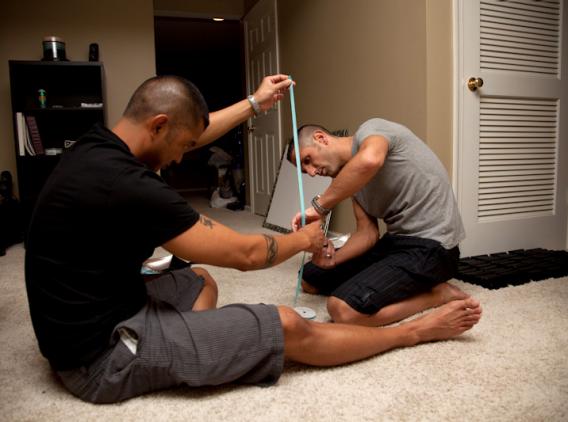
Photo by Jeff Sheng
For the first time, I meet some of Will and Erwynn’s family who will attend the wedding. Erwynn’s parents aren’t coming. They have met Will and hosted them in their home, but they are still struggling to accept that Erwynn is gay. A few weeks before the wedding, I spoke with Erwynn’s mother, Joy Umali, on the phone. She told me she loves her son very much. She thinks she may be able to accept their relationship eventually, but she finds it a shock, because “we didn’t raise him that way.” She’s still adjusting. She also says she didn’t think she could get time off from her job. (She works in a factory.) Erwynn’s younger sister, Sherwynn, who’s representing the Umali side at the wedding, points out that her parents live in California, and she thinks the cost of the trip influenced their decision not to come. But Sherwynn is unconflicted in her delight. “I’m really proud that my brother is so comfortable and open that he can do this,” she says.
Will has had little contact with his parents since his divorce. He didn’t invite them to the wedding, knowing how strongly they disapprove of his relationship with Erwynn. Will’s three aunts—his father’s sisters—and three of their grown children, along with spouses, are representing the Behrens side. Will saw them once a year when he was growing up, but he had mostly lost touch with them in adulthood. His parents never told his extended family about Will’s divorce. But last September, on the day DADT was repealed, Will and Erwynn celebrated by coming out on Facebook. They posted pictures together and declared that they were engaged. The news immediately sparked a wave of surprise through the Behrens family. His aunts reached out to him. Since Will isn’t on speaking terms with his parents, he had assumed that no one in the family wanted anything to do with him. Facebook allowed him to reconnect with his father’s family.
Will’s aunts, a gregarious trio of middle-aged women, all live in small towns near Harrisburg, Pa. Along with Will’s father, they were raised in a very strict household and were saved as Baptists when they were teenagers. “We just love Will and Erwynn,” one of the aunts, Patty Garver, tells me. “We don’t condone what they are doing. They know that. But we are here because they are family, and you don’t turn your back on family.” Another aunt, Nancy Wolf, agrees with Patty that homosexuality is a sin, but so is divorce. “And we’re both divorced,” Nancy points out. Patty has been impressed by what a good father Erwynn is to Will’s children as well as his own.
Patty and Nancy used to support DADT. But they have changed their minds after learning how hard it was for Will and Erwynn. It’s “not a lifestyle I would choose,” Nancy tells me. She and her other sister, Wanda Jones, suspected Will might be gay even when he was a preteen. The more time they’ve spent with Will and Erwynn, says Nancy, the more she’s thought that perhaps gay people are born that way.
The first time Will and Erwynn came to visit Patty, she freaked out about having them sleep together in the bedroom next to hers. She’s generally not comfortable with unmarried couples sleeping in the same room in her house. But this time, she had extra angst. “I was still really adjusting,” she says. “They really had no place else to stay except go to a motel. And I hated for them to do that.” She called Nancy to ask whether she should put them on the sofa bed instead of a bedroom. Nancy urged her to get over it and let them sleep in the guest room.
Patty wonders whether Will and Erwynn will kiss at the ceremony in front of the children. “I just have this problem” with two men kissing, she says. But the aunts don’t let their discomfort get in the way of risqué humor. They pepper the conversation with unprintable wisecracks and anecdotes about Will and Erwynn. “Do you know when they are going to open presents?” Nancy says with a wicked grin. “I have a gift for them, but they can’t open it in front of the kids.”
Everyone piles into cars to bring decorations for the reception to the base community center. I follow Erwynn’s car through the driving rain. It’s easy to pick out. It’s the only car with an Air Force sticker and a Human Rights Campaign equality logo on the back. Will’s aunts, uncles, and cousins pitch in enthusiastically to set up the banquet hall. Will instructs everyone to put the placemats an inch from the edge of the table. He suggests fluffing the netting on individually tied favors filled with candies. Erwynn climbs a ladder to hang a “Love” sign over the banquet tables. The kids practice their dance moves, make up rhymes about the wedding, and design congratulations cards to surprise their dads at the reception. They go around giving group hugs to everyone, including me.
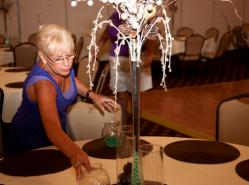
Photo by Jeff Sheng
In Congress, military bases are a gay-marriage battlefield. In May, the House passed—and the Senate later defeated—a provision specifying that military facilities may not "officiate, solemnize or perform a marriage or marriage-like ceremony involving anything other than the union of one man with one woman." But at McGuire-Dix, I find no signs of tension. One person attending the wedding mentions that he still hears homophobic jokes on the base. But two civilians employed at McGuire-Dix say that most folks who are stationed there probably didn’t know about Will and Erwynn’s wedding, and that anyone who’s upset about it would likely keep it to himself. Still, the respectful silence is remarkable. Not one of the nearly dozen people I ask has heard any complaints about the wedding.
Staff Sgt. Elizabeth Garcia, a chaplain’s assistant on the base, says she’s been shocked by the complete lack of pushback she’s witnessed since the repeal of DADT. She’s excited to be part of the wedding. The base’s Wing Chaplain, Air Force Col. Timothy Wagoner, is a Southern Baptist, a denomination that rejects same-sex marriage. “The military community is very professional,” he explains. “I haven’t heard anything negative, only positive things like, ‘It’s about time!’ ” Erwynn is “well-known for being an outstanding leader on base,” says Wagoner. “So it’s important that he feels supported.”
* * *
At 1:30 p.m. on June 23, 2012, around 150 guests take their seats in the chapel. An usher walks Sherwynn and each of Will’s aunts down the aisle to the family section, accompanied by a piano version of Miley Cyrus’ “The Climb,” which the kids begged to include in the ceremony. Eric Alva, who was the first U.S. serviceman seriously injured in the Iraq war—and later came out and fought to repeal DADT—gives an opening blessing. He explains the historic nature of the first same-sex ceremony on this base. A friend of Will’s, Cecilia Cox, reads from Goodridge v. Department of Public Health, the court opinion that legalized same-sex marriage in Massachusetts. Paige Martin, a colleague of Erwynn’s, begins singing Kelly Clarkson’s “A Moment Like This.” As she does so, the children take turns coming toward the altar, youngest to eldest, beaming. The double doors of the chapel open wide, and here come the grooms. Erwynn is in his dress blues. Will is in a tux. Arm in arm, they walk down the aisle.
The chaplain, Kay Reeb, asks, “Who giveth these grooms away?” It’s an awkward question. Neither man’s parents are here to represent the previous generation. So the union will be blessed by the next generation. The kids form a huddle in front of their dads. Will and Erwynn pretend to look nervous. “We do!” the kids shout in unison. The audience giggles and cheers.
Jerry Souza, a high-school friend of Will’s, sings the Irish song, “A Bird Without Wings.”
Like a bird without wings
That longs to be flying
Like a motherless child
Left lonely and crying
Like a song without words
Like a world without music
I wouldn’t know what to do
I’d be lost without you
Watchin’ over me.
As he sings, Will and Erwynn stand before the assembly, without their mothers, having risked everything to be together. They hold hands and look into each other’s eyes. Erwynn quietly wipes away tears.
The ceremony is decidedly Christian. Chaplain Reeb reads Bible passages and evokes Jesus’ name in her prayers. In his vows, Will points out that they both come from conservative, religious families. He speaks of how glad he is that God made their paths cross. “I never met anyone that it was worth giving it all up for, until I met you,” he says. He closes with, “I give you my heart, my faith. I choose you today—forever and a day.”
Erwynn speaks about all the trials they’ve been through together. After choking up, he jokes, “I’m trying to keep my military composure.” He vows: “Just like I would fight for my country and sacrifice for it, and even die for my country as a member of the Air Force, I would do all of that for you. You are my last love, forever and a day.”
Then they take vows to each other’s children. Will promises Erwynn’s sons, “If, God forbid, anything ever happened to your dad, I would always be there for you and love you.” Erwynn assures Will’s daughter that she now has five bodyguards. And in deference to Will’s son, who uses “I like you” as code for “I love you,” Erwynn tells the smiling 9-year-old, “I like you very much.”
Will and Erwynn are pronounced husband and husband. They kiss and light the family unity candles. The kids give white roses to the family members in attendance. Then the couple intones, “Umali-Behrens family: ATTENTION!” The kids snap to attention. Together, they yell, “Cordon POST!” The honor guard—a ceremonial unit that can be requested by members of the military for special occasions—enters the chapel, takes its position, and raises swords in an arch over the aisle. The Black Eyed Peas’ “Tonight’s Gonna Be a Good Night” starts to play. The boys don aviator shades, and each kid takes a turn dancing down the aisle. The grooms go last.
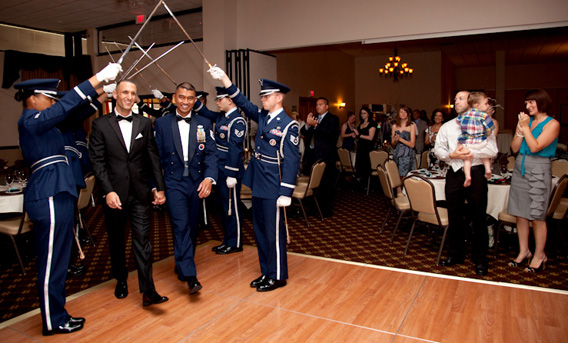
Photo by Jeff Sheng
At the reception, I meet Will and Erwynn’s community. Their initial guest count was 80. But by June it had almost doubled, as they got more yeses than they expected and invited friends who they discovered, to their surprise, were supportive of their union. The crowd is mostly straight couples under 40. Several have brought their young children along. There are a few old friends of Will and Erwynn’s, but mostly it’s co-workers and friends they’ve made in the last two years, including a handful of people they met through Outserve, an organization for active-duty gay and lesbian service members. By Will’s estimate, 80 to 85 percent of the couple’s friends are straight. Pastor Rick is there, along with his wife. I ask more than 20 guests whether this is their first same-sex ceremony. Every single straight person says yes.
Will gives his thank-you speech. “As some of you know, we don’t have a lot of family here,” he says. “But you all being here shows us that friends are our true family.” After they hold each other close for their first dance, Erwynn remarks with amazement, “I never thought I’d be able dance with a man like this on a military installation.”
It isn’t just the military that’s changing. After the guests work the buffet line and the cake is cut, I catch up with Will’s aunts. All three of them are floored by how moving they found the experience. “I can’t believe Will’s parents missed this,” Nancy tells me. Wanda says, “It was more emotional for me than seeing my own children get married, because it was so monumental, and because we know what they’ve been through.” The aunts’ favorite part was the grooms’ vows to each other and to the children. “Seeing the love in Erwynn’s eyes was so powerful,” says Wanda. Patty confesses that her husband, seated next to her, “cried the whole time.”
“We still don’t agree with it,” Patty adds. But with a maternal smile, she admits that when the grooms kissed, “I didn’t look away. I just went ahead and watched them kiss.”
The reception winds down. The couple and their four kids change into matching Team Umali-Behrens T-shirts. They’re off to Disney World for a weeklong “familymoon.” I can’t get over the aunts tearing it up on the dance floor with Will and Erwynn to the ‘80s hit “It’s Raining Men.” As the new family of six heads out to catch their flight to Orlando, Fla., the aunts stay behind to clean up. They’ll save the “Love” sign in the reception hall to give to Will and Erwynn when they get back.
Related Slide Show: See a photo gallery of Erwynn and Will's home and wedding.
Read a transcript of a Facebook chat with Will and Erwynn Umali-Behrens and author Katherine Goldstein.
